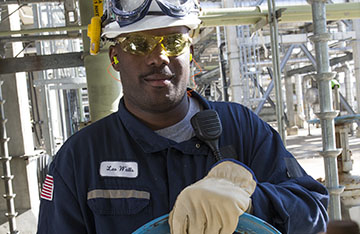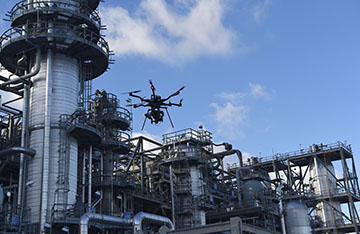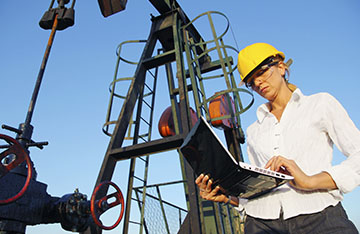API LSP - Long Seam Pipeline
Select Program:
Are You Qualified To Take The API LSP Exam?
The API LSP certification program is open to any applicant that currently holds a Level II or above in one or more of the following: ASNT, CGSB, PCN, or any other ISO 9712 accredited NDE certification. The minimum experience required MUST be documented on your application by providing the certification number from the applicable certifying body.
Candidates will need to successfully complete a performance demonstration examination for their specific program.
Exam Content
1. The API Long Seam Pipeline (LSP) exam will require qualified technicians to detect, characterize, and size features on long seam pipeline welds. The Certification will be an endorsement of the technician’s ability to perform in-the-ditch analysis of long seam features. The feature population may include lack of fusion, lamination, crack, hook crack, offset, trim, contact marks, inclusion, metal loss and surface discontinuities. The feature population may also include geometric reflectors and false call samples.
- Initial samples will focus on Low - High Frequency ERW welds
- Exam will be expanded to include flash-welded pipe seams, SAW, and DSAW
2. Candidates will select one primary method, and applicable supplemental methods to use, during the application process that will then be specified on the certificate.
- Candidates will be required to demonstrate their ability to calibrate their primary method.
- Candidates who fail to demonstrate ability to calibrate the primary equipment will not be able to use that on the exam.
- Recommendation for calibration blocks: For ultrasonic methods using a flat transducer wedge, we recommend a sensitivity calibration based off a carbon steel NAVSHIP calibration block, or equivalent for curved ultrasonic transducer wedges.
3. Most pipe samples will be 36 in. long by 12 in. wide and may not be full diameter.
- Approximately 80 linear inches of weld are presented for inspection and documentation.
- May not be full diameter since coupons will be cut to form exam samples.
4. The designed procedure provides guidelines and techniques for ultrasonic sizing of planar cracks which originate at the opposite side of the scanning surface or the inside diameter. This procedure is applicable to carbon steel material thickness from 0.150 inches to 0.500 inches.
5. Please review all documentation below, prior to your test day, for pertinent information related to Test procedures and Exam day, which include:
- Samples' geometry and presentation
- Blank exam forms for exam day
- Grading criteria
- Required paperwork
- Security
- Other FAQs
Test Procedures and Exam Report Forms
Exam Day
1. The API LSP exam is administered using the hands-on, performance demonstration testing method.
2. The test is conducted over a 1-day, 8-hour period at the PRCI Technology Development Center in Houston, TX. The address is 6410-J Langfield Road, Houston, TX, 77092
3. API LSP Candidate Orientation - Please review prior to Exam Day.
4. Testing Security Procedure
- Candidates must sign the NDA prior to the start of their exam.
- Candidates may not bring any prohibited aids, including data stored on the equipment.
- Equipment must be searched before and after the exam.
- All equipment transmission capabilities will be shut off for the duration of the exam.
5. Proper attire - Please note that PRCI requires all API exam candidates to wear long pants, shirts with sleeves, and closed toe shoes (steel-toed recommended). Also, remember to bring any PPE that may be required by exam-specific guidelines.
Additional Resources
- The certification term for API LSP is 3 years.
- Full testing is required for recertification every 3 years.
- Technicians must currently hold a Level II or above in one or more of the following: ASNT, CGSB, PCN, or any other ISO 9712 accredited NDE certification.
- You may apply for recertification 90 days prior to the certification expiration date. Apply online in the ICP Portal.
- API also allows a 90-day grace period for submitting a recertification application. Late fees will apply. If applications are not submitted by the 90-day grace period, your certification will expire.
- Circumstances such as heavy work schedule or work in other countries or remote areas do not relieve the inspector/examiner of the responsibility to file a timely renewal application.
The Long Seam Pipeline Certification (LSP) program was developed to help pipeline operators improve reliance of in-the-ditch NDE results and the ability to calibrate in-line-inspection tools. A key component of a pipeline integrity management program is the follow up and validation of the ILI results by the technician using appropriate NDE techniques for the more detailed in-the-ditch assessment.
The certification will be an endorsement of the technician’s ability to perform in-the-ditch analysis of long seam defects. It will require a practical exam where qualified technicians will be tested on their ability to detect, characterize, and size features. The exam uses a set of samples with features known to be an issue in pipe long seams, currently with an emphasis on ERW long seams.
The methods used to pass the exam will be identified on the technician’s certification so that operators will be aware of what techniques were used and can evaluate the technician’s skill accordingly.
API certifications are valid for three-year terms.





